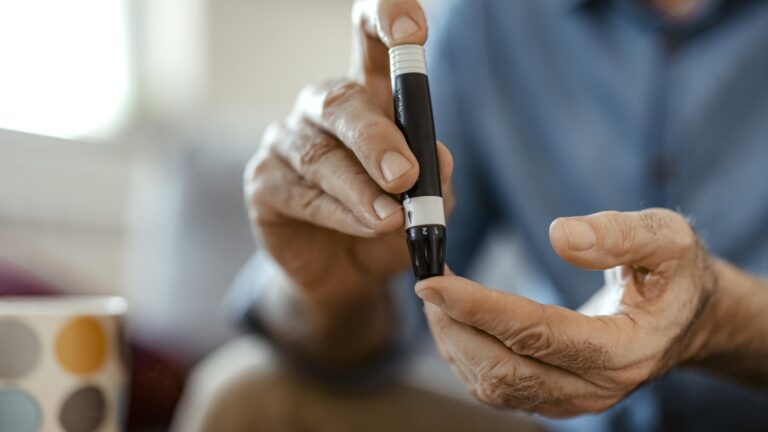As the new year approaches, many people will add weight loss or weight management to their lists of New Year’s resolutions. For many, weight management is an important factor that helps support their health and their general well-being.
“Carrying excess weight is a major risk factor for type 2 diabetes,” said Dr. Kevin Wasco, general surgeon and co-director of the ThedaCare Bariatrics Program. “In fact, 90% of people with type 2 diabetes are overweight or obese. Many people understand that maintaining a healthy weight helps prevent this metabolic disease.
Many studies have explored the relationship between weight and diabetes. New information suggests that bariatric surgery may possibly help improve the symptoms of type 2 diabetes, or even reverse the disease completely.
This is a popular topic among health care providers as the burden of diabetes continues to increase. Effective treatment options can help improve the quality of life for millions of Americans and reduce the strain of diabetes on our healthcare system. According to a Report from the American Diabetes AssociationDiabetes cost Americans $412.9 billion in 2022 alone.
“Bariatric surgery is one of the most promising solutions to combat type 2 diabetes,” explained Dr. Wasco.
Diabetes Awareness
November is American Diabetes Month. It’s time to highlight the difficulties of people living with diabetes. It also provides an opportunity to educate people about the realities of this largely preventable disease that affects more than 38 million Americans.
Diabetes is a metabolic disease that prevents your body from maintaining healthy blood sugar levels. People with type 1 diabetes produce very little or no insulin. With type 2 diabetes, either your pancreas can’t produce enough insulin or your body no longer responds to insulin as it should.
Type 1 diabetes is often genetic, while type 2 diabetes results from lifestyle factors such as diet and physical inactivity.
Left untreated, diabetes can lead to many health problems. For example, high blood sugar can damage organs, nerves, and tissues throughout the body. It can also lead to kidney problems, diabetic peripheryI neuropathyand vision problems.
Weight loss surgery for diabetes
Although there is no way to reverse or prevent type 1 diabetes, studies show that lifestyle changes and weight loss can help reduce symptoms and even reverse type 1 diabetes. 2. Some procedures produce better results than others, with bariatric surgery leading the way.
Bariatric surgery includes various surgical procedures that can help people lose weight. Eligible people include those with a BMI of 40 or more, as well as people with a BMI of 35 or more and with at least one other significant health condition, such as type 2 diabetes.
“It is encouraging to see results in improving and often reversing type 2 diabetes in the patients we serve,” said Dr. Wasco. “The ThedaCare Bariatrics program has seen 98% improvement or resolution of type 2 diabetes in our patients. »
ThedaCare offers two types of bariatric surgery:
- Roux-en-Y gastric bypass: The most common and successful surgery at ThedaCare, this procedure restricts the size of the stomach by partially bypassing the small intestine. It provides the fastest and most complete weight loss.
- Gastric sleeve resection: Sometimes a better choice for people with significant medical problems, this procedure removes about two-thirds of the stomach. This also allows for future procedures if a person regains weight.
On average, people will lose a total of 125 to 150 pounds within a year or more after bariatric surgery. Nearly 75% of patients maintain their significant weight loss after five years.
A major decision
Embarking on bariatric surgery is a serious decision, like any other surgical procedure, especially when diabetes is a factor. The qualified surgeons in ThedaCare Bariatrics program help people evaluate these risks to determine if bariatric surgery is a safe and appropriate option.
“We often hear that these procedures give people a second chance by improving their health and quality of life,” said Dr. Wasco.
In addition to helping resolve type 2 diabetes, the ThedaCare Bariatrics program has seen other impressive patient results, including:
- 99% improvement or resolution of acid reflux
- 95% improvement or resolution of sleep apnea
- 92% improvement or resolution of high blood pressure
Bariatric surgery is both safe and effective. The ThedaCare Bariatrics team is available to support people every step of the way. The team includes surgeons, nurses, dietitians, exercise physiologists, behavioral health specialists and care managers. They work together to guide patients through the process, from surgical preparation, to the procedure itself, to lifelong support afterward.
“Our comprehensive program is what sets us apart,” said Dr. Wasco. “For those who qualify and are ready to make a change, bariatric surgery can be truly transformative.”
About ThedaCare
For more than 110 years, ThedaCare® has been committed to improving the health and well-being of the communities it serves in northeast and central Wisconsin. The organization provides care to more than 650,000 residents in 17 counties and employs approximately 7,000 providers and team members. ThedaCare has 180 points of care, including eight hospitals. As an organization committed to being a leader in population health, team members are dedicated to empowering people to live their unique, best lives. ThedaCare also partners with communities to understand needs, find solutions together, and encourage health awareness and action. ThedaCare is the first in Wisconsin to be a member of the Mayo Clinic Care Network, giving specialists the opportunity to consult with Mayo Clinic experts about a patient’s care. ThedaCare is proud to partner with Children’s Wisconsin Health Network, Froedtert and Medical College of Wisconsin to improve convenient access to the most advanced levels of specialty care. ThedaCare is a not-for-profit health system with a Level II Trauma Center, comprehensive cancer, stroke and heart treatment programs, and primary care.
For more information, visit thedacare.org or follow ThedaCare on social media. Members of the media should call Cassandra Wallace, Public and Media Relations Consultant at 920.442.0328 or the ThedaCare-Neenah Regional Medical Center switchboard at 920.729.3100 and ask for the marketing person on call.
